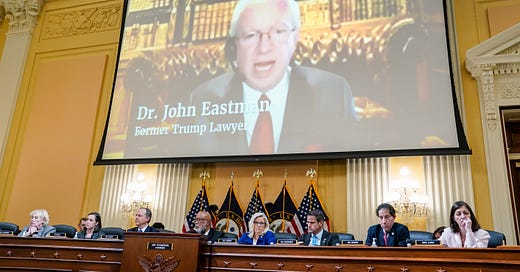John Eastman’s Moral Turpitude
Two days after a court recommends the coup plotter’s disbarment, his children compare him to Jesus.

IS JOHN EASTMAN, THE ARCHITECT of the plot to steal the 2020 presidential election, a good person who has done bad things, or is he simply a bad person? I’ve long had a fascination with this man, with whom I’ve had occasional exchanges, and who has gone from respected conservative legal scholar to MAGA fanatic, willing to sacrifice his reputation, his license to practice law, and quite possibly his liberty in the service of a grifter by the name of Donald Trump.
Eastman is facing criminal charges in the election theft racketeering conspiracy case pending in Fulton County, Georgia. It might be a year or more before a verdict is reached in that case—but that doesn’t mean Eastman will go that long before facing consequences for his actions following the 2020 election. A trial concluded last week in California’s state bar court entailing months of testimony and argument over the question of whether he should be sanctioned for violating the state’s legal code of ethics.
At issue was alleged “misconduct surrounding Eastman’s involvement in the efforts to reject, delay and/or obstruct the electoral vote after the 2020 presidential election.” After hearing all the evidence, Judge Yvette Roland found, in a 128-page decision, that “Eastman’s wrongdoing constitutes exceptionally serious ethical violations,” and she ruled that “the most severe available professional sanction is warranted to protect the public.” That most severe penalty is disbarment, a final ruling on which will ultimately come before the California Supreme Court. In the interim, Eastman has been ordered to “involuntary inactive status.” In other words, his law license has been suspended.
The most serious charge in the disbarment proceedings against Eastman was that he had “conspired with President Trump to obstruct a lawful function of the government of the United States; specifically, by conspiring to disrupt the electoral count on January 6, 2021.” But also among the eleven charges against Eastman were eight counts of moral turpitude. Seven of these eight were proved by “clear and convincing evidence.” It is worth reviewing a selection of what some of those counts entailed; all told, they encompass a series of falsehoods about the 2020 presidential election put forward for both private and public consumption in the service of the intended coup.
Let’s start with the infamous “Eastman memos.” On December 23, 2020, while serving as a lawyer both to Trump and to the Trump presidential campaign, Eastman drafted a two-page memo (the “short” version) to fellow Trump attorneys, which claimed that seven states—Arizona, Georgia, Michigan, Pennsylvania, Nevada, New Mexico, and Wisconsin—had transmitted dual slates of electors to the president of the Senate (that is, to Vice President Mike Pence).
On January 3, 2021, in a six-page memo expanding on his argument (the “long” version), Eastman maintained that in the election,
there had been “outright fraud” through “electronic manipulation of voting tabulation machines”;
the state of Michigan had “mailed out absentee ballots to every registered voter, contrary to statutory requirement that voter [sic] apply for absentee ballots”; and
the “election was stolen by a strategic Democrat plan to systematically flout existing election laws for partisan advantage.”
In an appearance on January 2, 2021, on Steve Bannon’s War Room radio program, Eastman contended that there was “massive evidence of fraud” involving absentee ballots in the presidential election, “most egregiously in Georgia and Pennsylvania and Wisconsin,” and the fraud had been on a scale that “affected the outcome of the election.”
In a January 18, 2021 article in the American Mind, a web magazine published by the Claremont Institute, the think tank with which Eastman has been associated for a quarter century, he alleged that election fraud had been found in Fulton County, Georgia, “where suitcases of ballots were pulled from under the table after election observers had been sent home for the night”; in parts of Wayne County (Detroit), Michigan, “where there are more absentee votes cast than had been requested”; and in Antrim County, Michigan, “where votes were electronically flipped from Trump to Biden.”
All the statements above were false, and Eastman either knew them to be false or, if he had exercised a modicum of due care, should have known them to be false. All of them were put forward in the service of justifying or launching a coup, interrupting the peaceful transfer of power from one administration to the next, bringing an end to a tradition that had been upheld in the United States since the Civil War.
EASTMAN ARGUED IN COURT that he could not be found guilty because his statements amounted to nothing more than “zealous advocacy” on behalf of his client, and what is more, his writings and speech were protected by the First Amendment.
Both of these defenses failed. Judge Roland noted that while zealous advocacy on behalf of a client is indeed a lawyer’s duty, his “primary duty” is to the truth, and it is a grave breach of ethical obligations to present falsehoods in support of legal arguments.
As for the First Amendment, it of course protects freedom of speech, including the spreading of lies, which by itself is not a crime. But Eastman was charged with making false statements in his capacity as an attorney. It is well established that, to preserve public confidence in the legal system and to maintain professional standards, the state can professionally punish attorneys who lie or mislead the public. He is welcome to go on lying—that is his First Amendment right—but he cannot expect to lie in this way about matters like these and go on calling himself an officer of the court.
And although Eastman’s family and colleagues have been writing articles claiming that he is being unfairly persecuted—culminating in an astonishingly crass fundraising message from his children over the weekend that, no joke, compares the investigations into Eastman for his attempted election theft to the betrayal and crucifixion of Jesus—it is clear that Eastman had a consciousness of guilt well before he was indicted in Georgia or came up on charges brought by the California Bar Association.
White House lawyer Eric Herschmann had acidly told Eastman on January 7, 2021, the day after the insurrection, to “get a great fucking criminal defense lawyer, you’re going to need it.” Four days later, Eastman contacted Rudy Giuliani requesting a pardon from Trump. “I’ve decided that I should be on the pardon list, if that’s still in the works,” wrote Eastman in an email uncovered by the House January 6th Committee. Short of an outright confession, there can be no clearer indicator of knowledge of one’s own liability for criminal prosecution than such a request for a preemptive pardon. Nor should it escape notice that, summoned before the committee, to avoid self-incrimination Eastman repeatedly—more than one hundred times—invoked the Fifth Amendment right to remain silent.
THIS RETURNS US TO THE UNANSWERABLE QUESTION with which we began: Is this coup plotter a good or a bad person?
Some years ago, Eastman sent me an email in response to an article I had written about the Trump presidential campaign’s eagerness to accept “dirt” on Hillary Clinton from Russia’s intelligence service. I don’t have Eastman’s permission to reproduce what he wrote me, but the gist of it was that any campaign would have leapt at the chance to find such dirt, even given the unsavory source. My response began: “Wow, John, just wow. The only acceptable response to an offer of dirt from the Russian gov is to call the FBI—no matter what they are promising.” Eastman had a different point of view; he’s been a would-be malefactor long before January 6th.
Moral turpitude is generally understood in American law to encompass acts “of baseness, vileness, or depravity in the private and social duties which a man owes to his fellow men,” or “wicked, deviant behavior constituting an immoral, unethical, or unjust departure from ordinary social standards such that it would shock a community.” Eastman has been found guilty of seven counts of just such moral turpitude. However one judges him as a person, and even if he is lucky and not convicted of a crime and sent to prison, through his actions he has left his name and reputation permanently stained.





